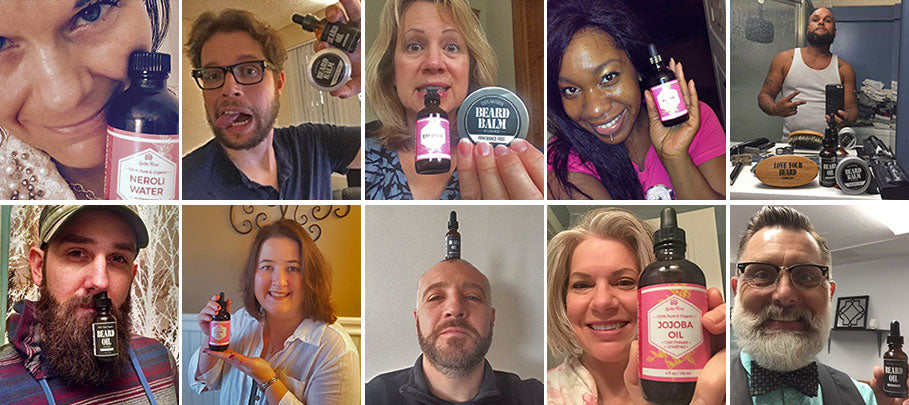How to avoid common homemade beauty mistakes
Making your own DIY beauty blends is on fleek these days. What's better than putting your fave ingredients together and knowing that you don't have extra chemicals, fillers, and processed gunk? It's a good trend that we hope sticks around.
That being said, there are some things to avoid.
1. Don't expose Bergamot Essential Oil to direct sunlight or put it in morning / day face serums.
At all times, Bergamot Oil needs to be protected from sunlight because of the bergaptene that it contains becomes poisonous when exposed to direct sun when it's in its purest form. Even after you apply it to your skin or mix it into a blend, it will make your skin photosensitive because it's a phototoxic oil.
Be sure to avoid putting Bergamot Oil in any daytime blends because it will make your skin red, or worse, burn you when you're in the sun during the day. It should be safe for nighttime use.
2. Don't purchase shea butter and oil in bulk if you won't use it right away.
It's really common to get your own ingredients and make your own body butters and face serums. It's fun, sometimes inexpensive, and makes for great gifts.
However, you need to know your supplier. More so, don't keep stuff on your shelf for too long, even if you got a good deal on it and figure you'll use it for the next holiday season.
Shea butter and natural oils usually have a shelf life of about a year before they run the risk of turning. Unscented body butters might start smelling rancid or you'll notice that it doesn't have the same sweet nature to it. A lot of product vendors keep supplies past their shelf life or sell them just a few months before they might expire.

Leven Rose uses only the freshest oils and ingredients for all their blends. And we work with our partners who only provide quality fresh ingredients as well.
If you're going to be regularly making your own mixes, ask your butter supplier how often they turn over their inventory.
3. Don't use plastic or clear bottles for long term blends.
Most pure products are sensitive to the containers they're in. Very pure and organic oils need glass to maintain their purity. Dark amber bottles protect the contents from UV rays that will perverse the ingredients and cause them to expire faster.
If you're spending your money on quality ingredients, it's important to store them in containers that will make them last!
What's wrong with plastic? Natural oils, especially essential oils, can eat away from the plastic itself or have chemicals from the plastic leech into your natural products. They're not immune to each other which makes for a not-so-great mix.
Now, if you're using a smaller bottle and planning on using it very quickly, a clear glass bottle is ok as long as you keep it out out of direct sunlight or any UV ray exposure. Again, that's only for small portions that you plan on using quickly. Always best to use dark glass bottles for mixes that you want to keep more than a month or so.
4. Don't use fragrance oil when you can use pure essential oils instead.
So, the truth is that fragrance oils are more consistent and last longer. But the way that they get that consistency and duration is usually from a chemical process with synthetic or unnatural ingredients.
Pure essential oils not only smell good, but they have skin benefits too! If you think about the fact that at least 60% of what we put on our body topically gets absorbed into your system (otherwise, why would nicotine patches work?), you can see why putting only pure ingredients into your blends is important.
You will see some variation between pure essential oil batches sometimes but that's ok! If you mix a few scents together in a glass jar for 12-24 hours before putting it into your DIY beauty blends, you'll see that they bond and have a greater likelihood of creating a unique scent that you can achieve more consistently.
5. Don't blend unlike oils together that are cloudy versus clear.
This sounds like an odd thing to avoid but if you remember back in science class, not all oils work together well. If you're blending oils together and then mixing in a shea butter, mango butter, beeswax, or any other firming bonder, you're probably ok.
But if you're sticking to just facial oil serums, hair oils, or any other oil-only blend, you're going to see the oils not playing friendly. If they're given as gifts, they might look a bit strange to your recipient.
Cloudy oils like Pure Emu Oil don't really mix well with clear oils like Pomegranate Seed Oil because of their different properties. It's better to keep Emu Oil by itself and then mix all the other oils together to make your own unique serum. You'll also find that natural hydrosols - meaning they're made from a water-based process - like our Pure Moroccan Rose Water also won't mix well with many oils. You know, oil and water and all...
Now, it's really common, especially in Europe, to have oil mixes that don't, well, mix well. If you don't mind that they look separated when they settle, just give them a good shake before applying.
Oils that we like to mix together in our DIY beauty mixes are:
Plus, we're always adding more! Check out all the natural beauty oils at LevenRose.com.
Do you have some other DIY beauty tips that we missed? Post them in the comments below!

